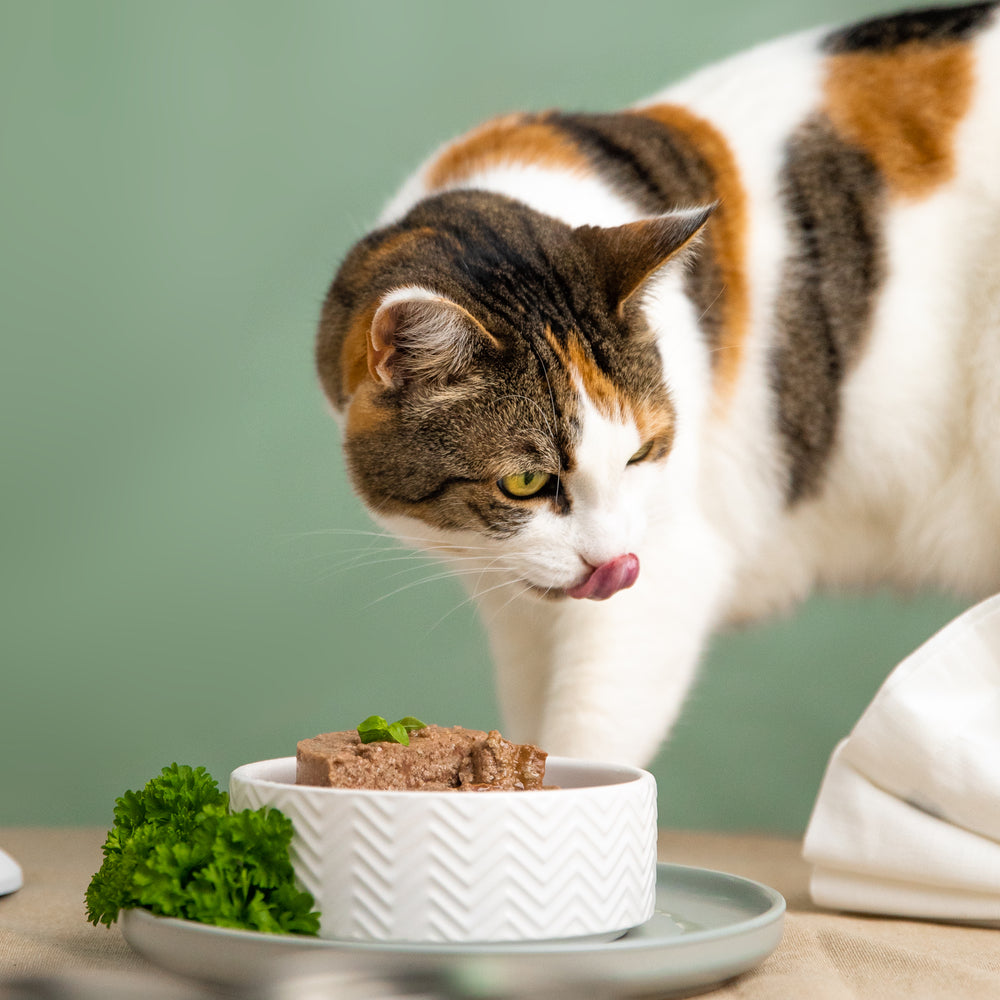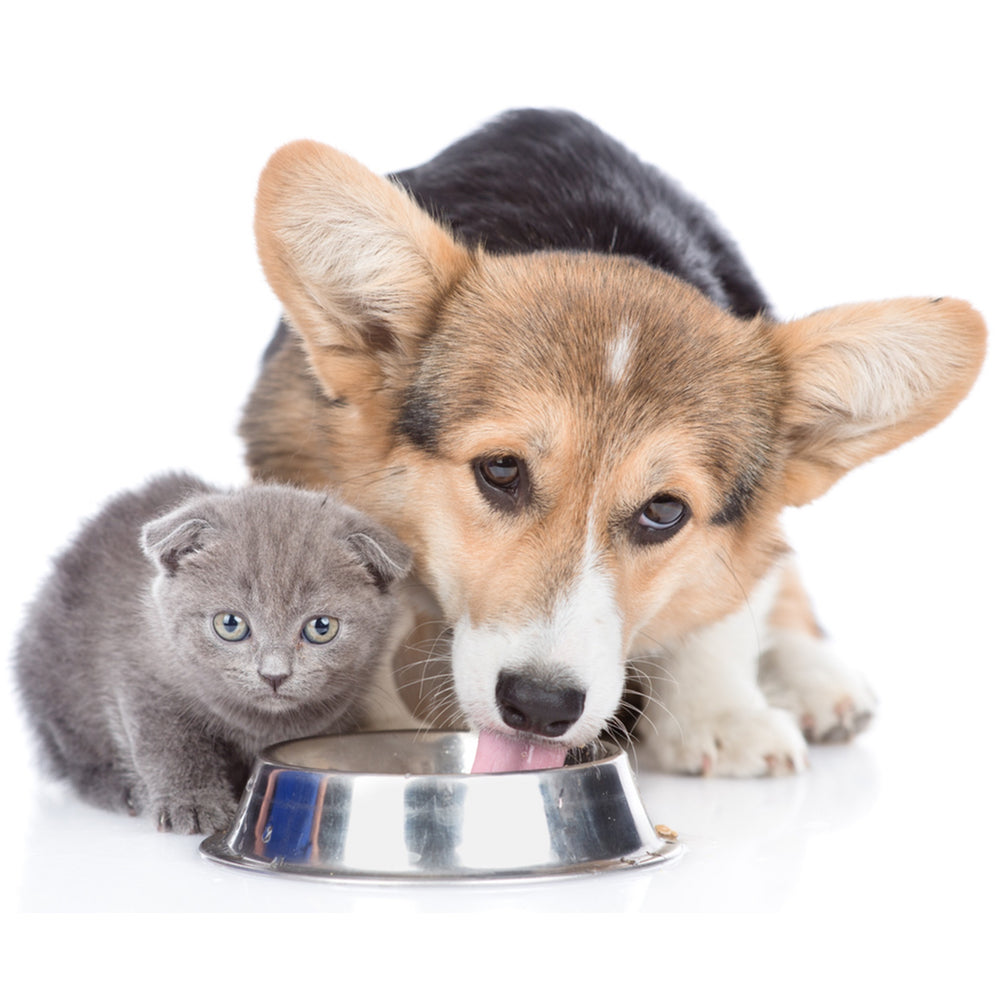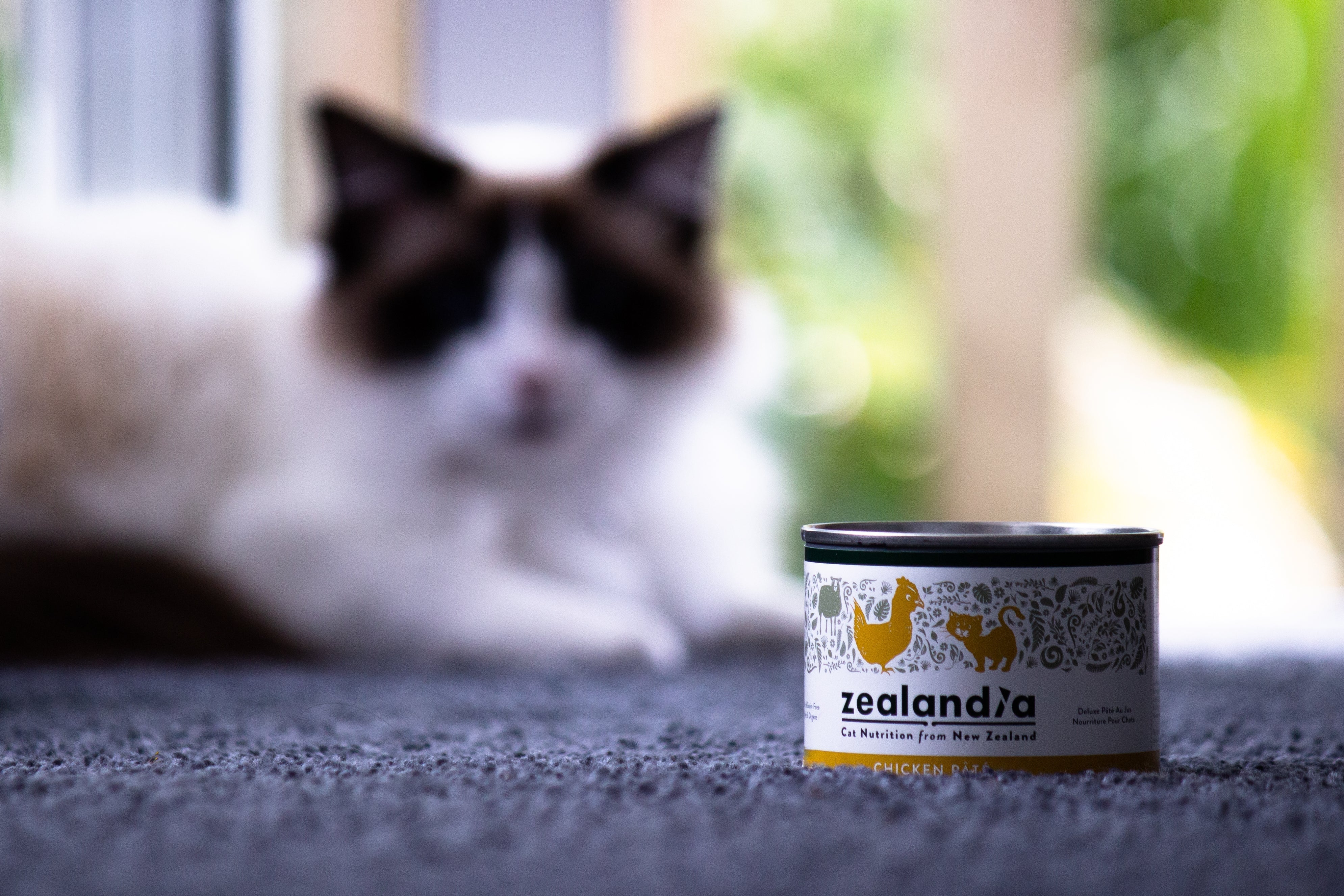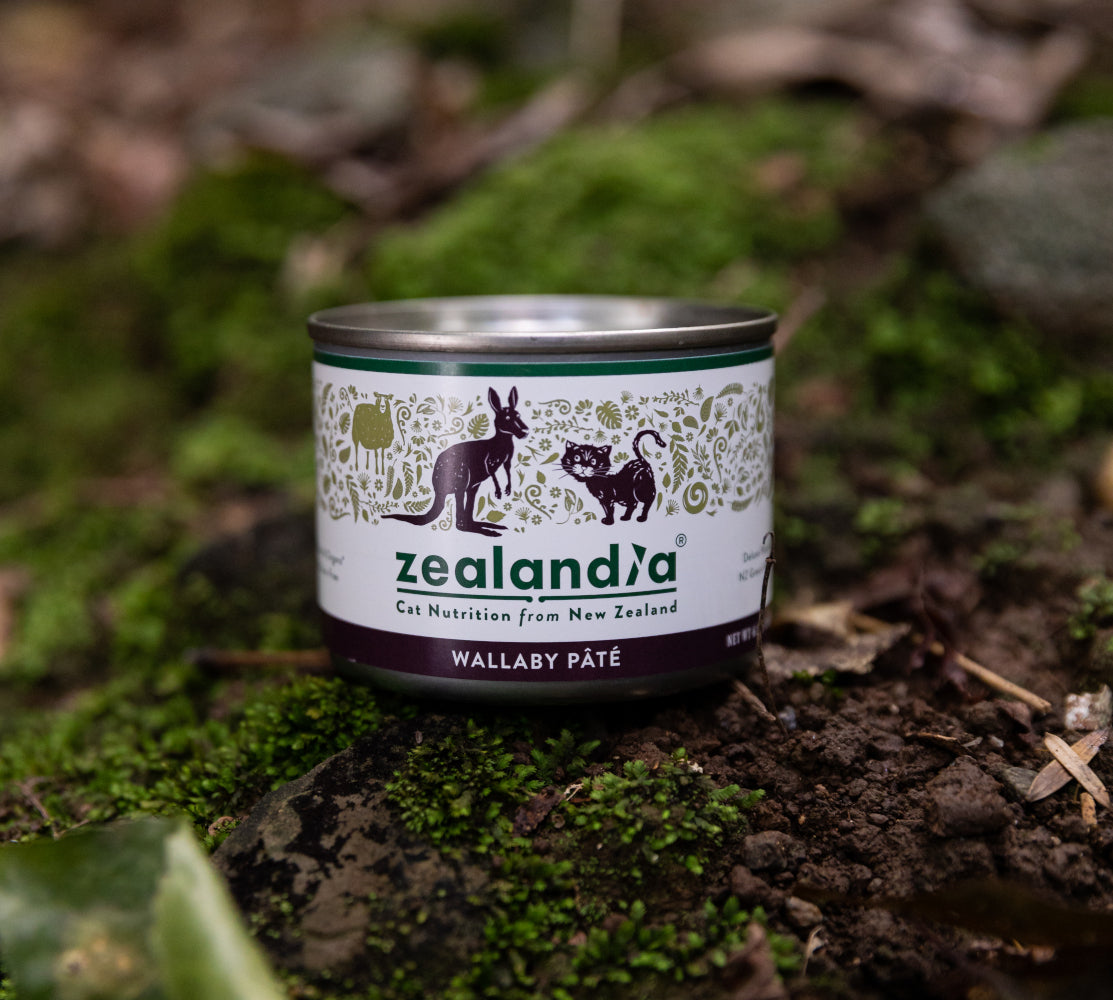Inflammatory Bowel Disease - What wet food is best for cats & dogs?

Written by Dr. Rosa Leedham BVMedSci (Hons) BVM BVS MRCVS (United Kingdom)
Do you find that your dog or cat commonly has an upset tummy? Does he suffer frequently from diarrhoea and vomiting? Perhaps he has a variable appetite and maybe has lost some weight. Although there are many possible causes of these symptoms, inflammatory bowel disease (IBD) is a common condition in dogs and cats responsible for causing ongoing gastrointestinal signs.
In this article, we will take a look at what IBD is, how it is diagnosed and how we can manage it. Diet plays a very important role in the management of IBD, so we will be taking a look at what food is best for dogs and cats with this condition.
What is inflammatory bowel disease?
Inflammatory bowel disease (IBD) is a common, but complex condition which causes chronic gastrointestinal (GI) symptoms in cats and dogs. Animals suffering from IBD have a chronically inflamed and irritated gastrointestinal tract. A large number of inflammatory cells enter the walls of the stomach and/or intestines. As a result, the walls of the gastrointestinal tract become thickened, and this affects their ability to digest and absorb nutrients.
Inflammatory bowel disease is a result of an abnormal immune reaction in the gastrointestinal tract. This immune system may overreact to even a normal diet or non-infectious bacteria. Genetics do play a role in the development of IBD in cats and dogs, with some breeds being predisposed to the condition. However, any breed of dog or cat can develop IBD. The disease is most commonly diagnosed in middle-aged and older animals, but it can occur at any age too.
What are the symptoms of IBD?
There is a range of symptoms associated with IBD. These signs can be persistent or intermittent and are usually chronic (meaning they occur over at least 4 weeks).
Common symptoms
The symptoms an animal displays depend on where in the gastrointestinal tract is affected, but common symptoms include:
- Vomiting
- Weight loss
- Reduced appetite, or total loss of appetite
- Diarrhoea (with or without blood and mucus)
- A rumbly tummy
- Abdominal discomfort
- Urgency to defecate
- Straining to defecate
Less common symptoms
Some animals suffering from IBD will also show signs of allergic skin disease, such as itching, redness of the skin and recurrent ear infections.
What about IBD in cats?
In cats, IBD differs slightly because it is common for the pancreas and liver to be affected too. This condition is called ‘triaditis’, where the three organs are affected simultaneously. Because of this, some cats with IBD will also show signs of jaundice. This is when there are high levels of the substance bilirubin in the blood, causing yellow discolouration of the skin, eyes and gums.
How is inflammatory bowel disease diagnosed?
If your dog or cat is suffering from ongoing gastrointestinal symptoms, then it is important to take your pet to your veterinary surgeon. Your vet will take a thorough history, perform a clinical examination and recommend any testing if necessary.
Testing may include:
- Blood and urine tests to check organ function, protein and vitamin levels
- Abdominal x-rays or scans to check for blockages or changes such as thickening of the gastrointestinal tract
- Faecal analysis to rule out infectious diseases (such as parasites)
If the findings of these initial tests are suggestive of IBD, then a biopsy is needed for a definitive diagnosis. A biopsy sample can be taken using an endoscope (a camera inserted into the stomach and start of the intestines) or during surgery. Once the sample of the stomach and/or intestines has been taken, it will be evaluated by a specialist under a microscope to see if there are changes consistent with IBD.
How is IBD treated?
There is a range of treatment options available for dogs and cats with IBD. Unfortunately, there is no single best treatment option. The treatment for IBD depends on the severity of the signs, what has been tried already and what you would like to do as an owner.
Usually, treatment of IBD will involve changing your pet’s diet, followed by administering certain medications such as antibiotics, anti-inflammatories or immunosuppressive drugs. Your vet may need to try multiple different combinations of diet and medication to determine the best therapy for your pet.
What should I feed my pet with IBD?
Dietary allergens play an important role in animals with IBD. A dietary allergen is a normally harmless substance, but causes an allergic reaction in a susceptible animal. If your pet has a mild form of IBD, then changing the food may be enough to improve his symptoms and medications may not be needed.
There is no one particular food which works for every animal with IBD. However, your vet will likely recommend a diet which is highly digestible, high in fibre and low in fat. Also, some animals with IBD find wet food easier to digest than dry food.
Because food allergies are an important component of IBD in dogs and cats, your vet will probably recommend an exclusion diet trial as part both of the diagnosis and treatment of IBD.
What is an exclusion diet trial?
The aim of an exclusion diet trial is to remove any ingredients that an animal has previously encountered, because these foods may be triggering the disease. Any food can be classed as a potential allergen and can therefore trigger a reaction in animals with IBD. The most common allergens in food are protein or carbohydrates. Animals which have dietary responsive IBD should improve within two weeks of being fed a new food, but it can take longer.
What types of food are used in a diet trial?
There are two main types of food which can be used for a food trial. A hypoallergenic diet is the first option. Hypoallergenic food has only a small number of ingredients with limited additives, and a ‘novel’ (new) protein and carbohydrate source.
Commonly encountered proteins are chicken, turkey, beef and lamb. Hypoallergenic food contains an uncommonly encountered protein source which your pet probably hasn’t eaten before. Goat, brushtail or wallaby are suitable choices because these proteins aren’t commonly found in pet food. This means your pet won’t already have an allergy to them and his immune system won’t be triggered to react.
The other alternative is a hydrolysed diet. This food has been processed so that the proteins in the food are broken into such small pieces that they cannot be recognised by an animal’s immune system and therefore won’t cause an intolerance.
Whichever type of food you opt to feed during an exclusion diet trial, your vet will advise you about how long you need to feed this new food. In most cases, it usually be for at least two weeks. If an animal improves with the change of food, then signs would probably recur if the old food was to be reintroduced. If this is the case, then long-term feeding of an appropriately balanced diet is likely to be one of the most important parts of controlling the disease.
It is important to gradually introduce a new food over 4-7 days by mixing the new food with the original diet and gradually increasing the amount of the new food each day. The most important thing to remember with a diet trial is that your pet must be fed nothing else. This includes table scraps, treats and even some flavoured medications – your veterinary surgeon will be able to advise you about whether any medications are going to interact with the diet trial. Dogs and cats should be offered water, but not milk to drink because milk is another common allergen.
How do I know if my pet is improving?
It is often a case of trial and error in the beginning whilst your vet tries to find the right combination of food and medications for your pet. When you are treating your pet for IBD, it is a good idea to keep a diary of how your pet is doing so that you can update your vet about how he has responded to each treatment option.
It is useful to record how you think your pet is feeling (are they lethargic or energetic?), how much of their food they have eaten, what their faecal character is or if they have vomited.
Summary
Sadly, there is no cure for IBD. Every animal is different and will respond differently to each diet and medication. In most cases, IBD can be controlled so that pets live happy, healthy and comfortable lives. Although your dog or cat may need to stay on a modified diet, such as wet hypoallergenic food for life, this may mean that medications can be avoided.
However, even with proper management, symptoms can come and go. It is important to follow the medical and dietary treatments that your veterinarian recommends and monitor your pet closely so that any relapses can be quickly addressed and the symptoms back under control.
----------------------------------------------------------------------------------------------------------------------------
Notes from the team at Zealandia:
Our canned food products contain 95% meat & organs (excluding water sufficient for processing). This is a typical summary of ingredients:
Deboned Meat: ~61.5%
Lamb Organs: ~30% (Liver, Lung, Green Tripe, Heart, Kidney, Plasma)
NZ Green Mussels: ~3%
Dried Yeast: ~3%
Vegetable Gums: ~1% (Guar Gum, Agar Agar)
Salmon Oil: ~0.5%
Vitamins & Minerals: ~1% (Calcium Carbonate, Potassium Chloride, Taurine, Choline Chloride, Iron Proteinate, Zinc Glycine Complex, Niacin Supplement, Alpha-Tocopherol Acetate, Sodium Selenite, Manganese Proteinate, Copper Glycine Complex, Thiamine Mononitrate, Calcium Pantothenate, Riboflavin, Pyridoxine Hydrochloride, Vitamin A Acetate, Biotin, Vitamin B12 Supplement, Calcium Iodate, Folic Acid, Cholecalciferol)
----------------------------------------------------------------------------------------------------------------------------
The Zealandia variants most suitable for dogs and cats with a history of Inflammatory Bowel Disease (IBD) are: Goat, Wallaby, Brushtail
- Novel Protein
- Moderate fat
- Low fibre
- Low carbohydrates
- Wet texture (hydration + digestibility)



